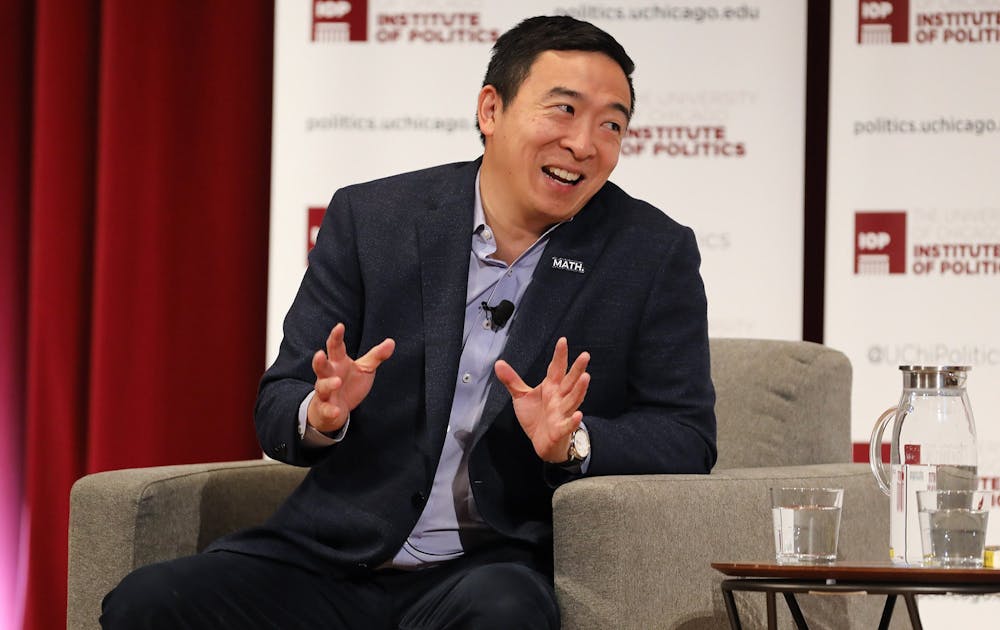As the New Hampshire primary elections wound down, Andrew Yang announced the end of his presidential campaign. While this announcement was disappointing for many of his supporters in the “Yang Gang,” there is reason to remain hopeful about what his campaign stood for.
Yang, a lawyer and entrepreneur, ran on a platform of being an outsider to politics in Washington, D.C., who wanted to prepare America for the unprecedented economic transition that technological automation would bring, according to his campaign website.
While many of his campaign policies, such as increased gun regulation, protecting abortion rights and easing the burden of student loans are largely standard issue among the 2020 Democratic candidates, Yang stood out from the rest as a tireless proponent of his proposal for a universal basic income. This policy is one of the boldest ideas to combat poverty that has been introduced recently and deserves legitimate attention from the federal government.
Yang’s campaign consistently pushed a singular policy to become synonymous with his name, and it worked.
“If you’ve heard anything about me and my campaign, you’ve heard that someone is running for president who wants to give every American $1,000 a month,” Yang said in a campaign video.
The so-called freedom dividend would create a universal basic income of $1,000 a month for every American adult citizen with no strings attached. The Foundation for Economic Education writes that universal basic income has never been implemented on a scale like the United States, but it is one of the most ambitious plans to combat poverty and income inequality that has been proposed this campaign cycle.
The idea of a UBI is far from new. Proposals for a UBI or something similar go back in the U.S. as far as the revolutionary author of "Common Sense," Thomas Paine. Local experiments testing the success of a UBI occurred in Canada and parts of the U.S., including Indiana, in the 1970s. President Richard Nixon even proposed a UBI policy in 1969 with his Family Assistance Plan.
While his campaign to become president has ended, his proposition to institute a UBI hasn’t. The Washington Post reports that Rep. Tulsi Gabbard, D-Hawaii, and Sen. Elizabeth Warren, D-Mass., have also stated they are open to the idea of creating a UBI policy.
As the problem of wealth inequality increases in the U.S., Yang’s steadfast push to make a universal basic income a mainstream policy has been successful. A poll by Hill-HarrisX in September 2019 found that 49% of registered voters were in favor of a UBI policy.
Davis Macke, a freshman at IU and a local Yang Gang organizer, was inspired by Yang’s campaign to join it as a volunteer so he could direct interested people toward information on how to get involved.
“I was undecided when I stumbled upon Yang. Two things caught my eye: his potential to unify the political divide in this nation and his emphasis on some real pertinent and pressing issues like AI, the tech race with China and job automation that no other politicians of either ideology seem to talk about,” Macke said.
When asked about Yang’s impression on American politics, Macke said he saw Yang as a breath of fresh air.
“I think that people like how politically refreshing he is. He never attacks other candidates and has fun on the trail. As a result, I think that he has inspired America to be a little kinder.”
In a moment in our nation’s history when national politics feels bitterly divisive and fragile, Yang offered a clear view of how to tackle some of the most important issues in our country today. Although he has stepped out of the presidential campaign, his ideas and policies will not.
Everett Kalman (he/him) is a junior studying law and public policy and is the vice president of external affairs for Culture of Care at IU. He plans on practicing immigration law in the future.






